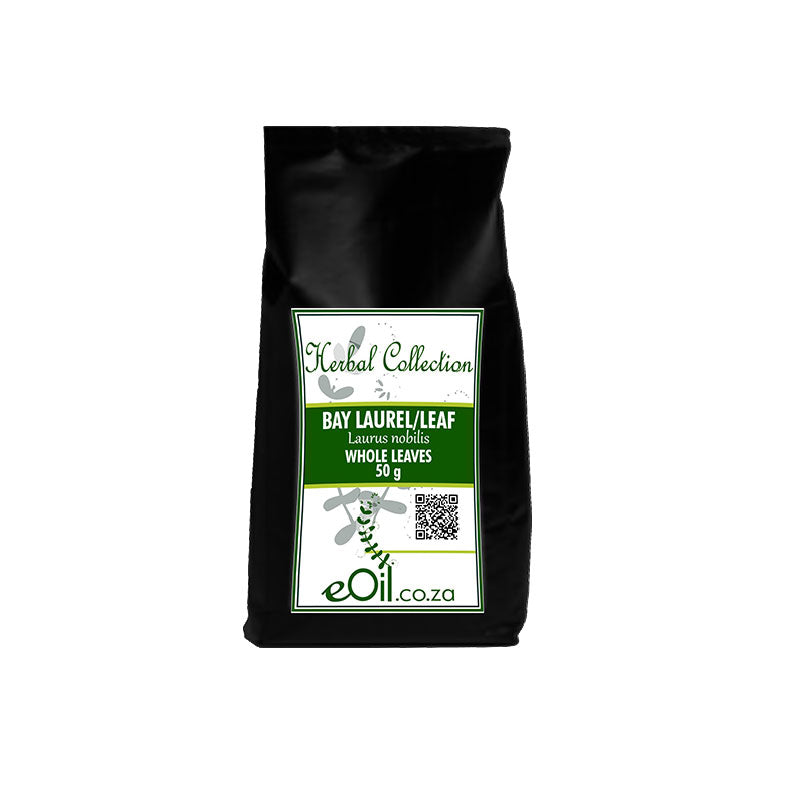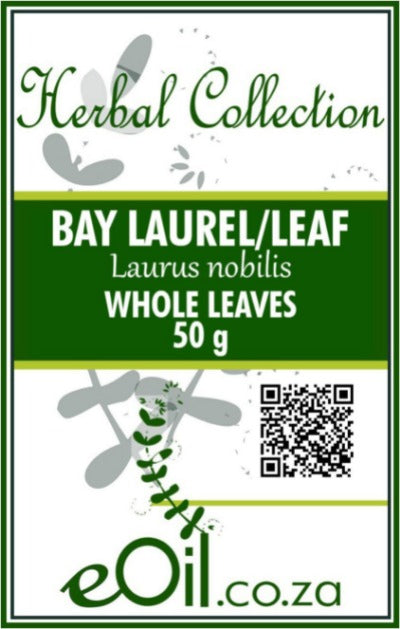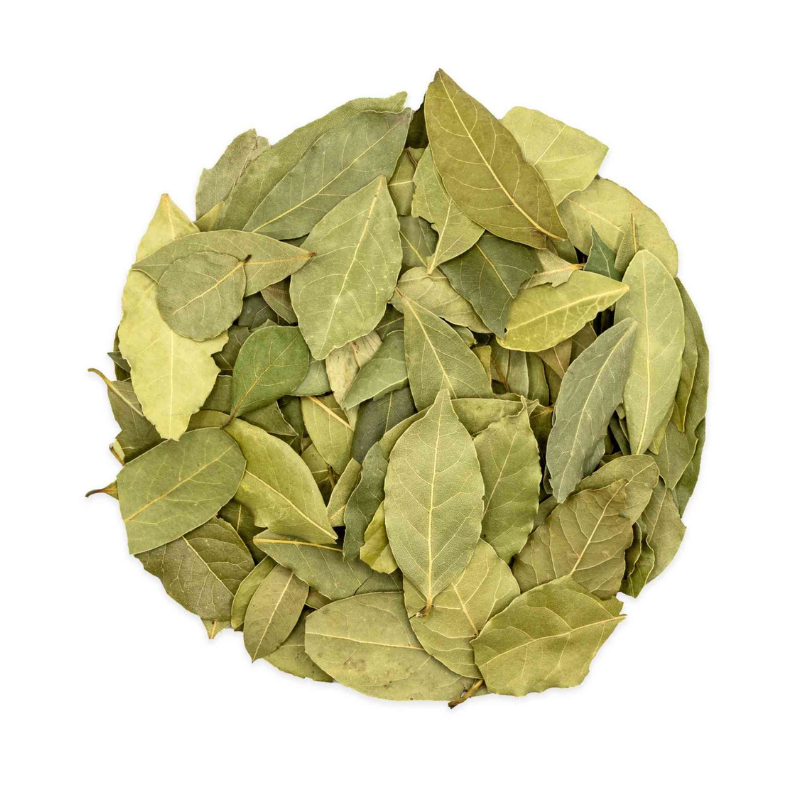Bay Leaf Whole - Herbal Collection
Bay Leaf Whole - Herbal Collection - 50 GR is backordered and will ship as soon as it is back in stock.
Description
Description
In the "Herbal Collection," we celebrate Bay Leaf as a potent wellness tool. It is rich in eucalyptol, making it a warming, aromatic herb for digestion and respiratory health.
Key Benefits & Uses:
Potent Digestive Tonic: This is its primary medicinal use. A strong Bay Leaf tea is a powerful carminative and digestive stimulant. It is traditionally used to soothe the stomach, relieve gas, bloating, and indigestion, and help process heavy meals.
Respiratory Support: The leaves contain natural essential oils that are released when steeped. Inhaling the steam of a Bay Leaf infusion can help to open the sinuses and ease mild cold and flu congestion.
Spiritual "Smudging" & Cleansing: Burning dry Bay Leaves is a popular wellness ritual. The smoke is believed to cleanse a space of negative energy, reduce anxiety, and promote focus and clarity (similar to Sage).
Culinary Master: Of course, it is the essential aromatic for adding depth and complexity to soups, stews, broths, and sauces.
How to Use (Wellness):
Digestive Tea: Crumble 1-2 dried leaves into a cup, pour over boiling water, cover, and steep for 10 minutes. Strain and drink after a meal.
Burning Ritual: Safely burn a single dried leaf in a fireproof bowl to release its aromatic, grounding smoke.
Important Cautions:
Do NOT eat the whole leaf. The leaves remain stiff even after cooking and can be a choking hazard or damage the throat. Always remove before serving/drinking.
Avoid large medicinal doses during pregnancy (culinary use is safe).
Shop premium Whole Dried Bay Leaves (*Laurus nobilis*). A versatile herb for digestive tea, culinary soups, and traditional burning (smudging) rituals.
TRADITIONALLY USED FOR
Bay leaves, also known as Laurus nobilis, are aromatic leaves commonly used in cooking for their distinctive flavor and fragrance.
They have been used for thousands of years in traditional medicine and culinary practices due to their various benefits and properties.
Here are some of the most notable benefits, properties, and traditional uses of bay leaves:
- Antioxidant properties: Bay leaves contain various compounds such as eugenol, cineole, and myrcene, which possess antioxidant properties. These antioxidants help neutralize free radicals, which can contribute to inflammation and various diseases.
- Anti-inflammatory effects: Bay leaves have been traditionally used to reduce inflammation and alleviate pain. Eugenol, one of the primary compounds found in bay leaves, has been shown to possess anti-inflammatory properties.
- Digestive health: Bay leaves have been used in traditional medicine to treat various digestive disorders, such as indigestion, gas, and bloating. The compounds found in bay leaves are believed to have a positive effect on the gastrointestinal system by promoting digestion and reducing flatulence.
- Respiratory relief: Inhaling the steam from boiled bay leaves has been used as a home remedy to help alleviate respiratory problems, such as congestion, cough, and bronchitis.
- Antibacterial and antifungal properties: Bay leaves contain compounds that exhibit antibacterial and antifungal properties, which can help protect against infections.
- Diabetes management: Some studies suggest that consuming bay leaves may help in managing blood sugar levels, making it potentially beneficial for people with diabetes.
- Wound healing: Bay leaves have been used traditionally to promote wound healing due to their antimicrobial and anti-inflammatory properties.
- Stress relief: The essential oil extracted from bay leaves is believed to possess calming properties, which may help reduce stress and anxiety when used in aromatherapy.
INFORMATION
Source : http://www.wikiphyto.org/wiki/Laurier_commun
Reference on http://www.wikiphyto.org
Translation in English by Google Translate (go to the page of the source linked | on Chrome cellphones go on the 3 dots on the top right and select translate in your preferred language | on laptop right click your mouse and select option translate when hoovering on the page
plant name
Common laurel, noble laurel , laurel , bay laurel
International Latin denomination
botanical family
Lauraceae
Description and habitat
- Beautiful spontaneous dioecious tree in the Mediterranean basin, dark gray and smooth bark, alternate leaves, entire, leathery, slightly wavy on the edges
- Crumpled, they give off a characteristic aromatic smell, yellow-green flowers in groups in the armpit of the leaves which will give globular green then black berries when ripe.
- Ornamental or condiment in gardens
- France, Morocco, Slovenia
History and tradition
- The pithia of Delphi used it in their oracles of divination
- It was consecrated to the vestals
- In Rome, it was believed that the withering of the shrub heralded disaster.
- Its foliage was braided into garlands during the Saturnalia in December
- Dedicated to Apollo and Aesculapius (Daphne was changed into a laurel to escape the attentions of Apollo)
Parts used
- Sheets
- leaf essential oil
Dosage forms available
Usual dosages
Composition
Main components of the plant
- Essential oil (1 to 3%)
- Sesquiterpene lactones : costunolide , deacetyl-laurenobiolide , 5a,9-dimethyl-3-methylene-3,3a,4,5,5a,6,7,8-octahydro-1-oxacyclopenta(c)azulen-2-one , 3beta -chlorodehydrocostuslactone
- Polysaccharides
- Polyphenols
- Isoquinoline alkaloids similar to those of boldo
Main components of buds or young shoots
Main components of essential oil
- Terpene oxides : 1.8 cineole (30-70%), beta-caryophyllene oxide
- Monoterpene alcohols : linalool , alpha-terpineol , terpinene-1-ol-4
- Esters : terpenyl acetate , linalyl acetate
- Sesquiterpene lactone : costunolide
- Monoterpenes : alpha-pinene , beta-pinene , paracymene , sabinene
- Sesquiterpenes ( alpha-copaene , allo-aromadendrene )
- Eugenol , methyl eugenol , beta-eudesmol , 1(12), 8(15)-caryophylladiene-9alpha-ol in small amount
Properties
Plant properties
- Stomach tonic, protection against stomach ulcer [1] , [2]
- Stimulates appetite and gastric juices
- Antidiarrheal [3]
- Antioxidant, antibacterial [4]
- Antibacterial activity against Gram-positive bacteria ( Staphylococcus aureus ATCC 25923, Enterococcus faecalis ATCC 29212, Staphylococcus epidermidis CIP 444) and Gram-negative bacteria ( Escherichia coli ATCC 35218, Pseudomonas aeruginosa ATCC 27853) by polysaccharides , oil greasy and essential oil [5]
- Reduces the risk of cardiovascular disease and diabetes, favorable action on total cholesterol, increase in HDL and lower LDL, reduction in triglycerides (1 to 3 grams of powder per day for one month) [6]
- Cytotoxic activity of certain sesquiterpene lactones ( 5a,9-dimethyl-3-methylene-3,3a,4,5,5a,6,7,8-octahydro-1-oxacyclopenta(c)azulen-2-one and 3beta-chlorodehydrocostuslactone [7]
- Analgesic and anti-inflammatory [8] , [9]
- Anti-acne, a hydro-alcoholic extract of Laurus nobilis suppresses the expression of pro-inflammatory cytokines mediated by Propionobacterium acnes (IL-1β, IL-6, NLRP3), and the NF-κB factor, potentialities in acne [ 10]
Bud properties
Properties of essential oil
- Anti-infective with pulmonary tropism and ENT, antibiofilm activity against Staphylococcus aureus [11]
- Antibacterial against Escherichia coli O157:H7, Listeria monocytogenes , Salmonella typhimurium , Staphylococcus aureus [12]
- Antiviral, inhibitory activity against the replication of SARS-CoV and HSV-1 viruses (association of beta-ocimene , 1,8-cineole , alpha-pinene , beta-pinene ) [13]
- Antifungal
- Mucolytic and expectorant
- Analgesic and antineuralgic, anti-inflammatory, comparable to morphine and piroxicam [14]
- Anti-epileptic, decreases convulsions induced by electroshock induced by pentylenetetrazole [15]
- Antidiabetic by inhibition of alpha-glucosidase and antioxidant [16]
- Improves alertness by inhalation [17]
- Antioxidant and antiproliferative against leukemic cells (chronic myeloid leukemia K562) [18] , antiproliferative activity against breast cancer cells (MCF7 breast adenocarcinoma) [19]
- Regulator of the vegetative nervous system (sympathetic and parasympathetic) with digestive tropism, antispasmodic, eupeptic
- Relaxing especially locally
Directions
Indications of the whole plant (phytotherapy)
- Bloating
- Slow digestion
- Flatulence
- belching
Indications of the bud (gemmotherapy)
Specific indications of essential oil (aromatherapy)
- Chronic bronchitis and sinusitis, flu
- Cutaneous, gynecological and digestive mycoses, viral hepatitis
- Acnes, psoriasis, bedsores, varicose ulcers
- Inappetence, dyspepsia, colitis, flatulence
- Gingivitis, mouth ulcers, periodontosis
- Arthritis, rheumatism, neuritis, neuralgia, muscle contractures
- Anxiety, depression
Known or suspected mode of action
- Costunolide is mucolytic and antiparasitic
Usual formulations
Regulations
- French Pharmacopoeia list A (sheet)
Possible side effects and precautions for use
- HE not recommended during pregnancy, and in children under 12 (presence of methyl eugenol ), in the event of a history of convulsion, caution in the event of antiepileptic treatment
- No prolonged use
- Possible allergic-type sensitization
Bibliographic references
- Aller↑ Afifi FU, Khalil E, Tamimi SO, Disi A. Evaluation of the gastroprotective effect of Laurus nobilis seeds on ethanol induced gastric ulcer in rats. J Ethnopharmacol. 1997 Sep;58(1):9-14. PMID 9323999
- Aller↑ Speroni E, Cervellati R, Dall'Acqua S, Guerra MC, Greco E, Govoni P, Innocenti G. Gastroprotective effect and antioxidant properties of different Laurus nobilis L. leaf extracts. J Med Food. 2011 May;14(5):499-504. doi: 10.1089/jmf.2010.0084. PMID 21314364
- Aller↑ Qnais EY, Abdulla FA, Kaddumi EG, Abdalla SS. Antidiarrheal activity of Laurus nobilis L. leaf extract in rats. J Med Food. 2012 Jan;15(1):51-7. doi: 10.1089/jmf.2011.1707. PMID 22082096
- Aller↑ Ramos C, Teixeira B, Batista I, Matos O, Serrano C, Neng NR, Nogueira JM, Nunes ML, Marques A. Antioxidant and antibacterial activity of essential oil and extracts of bay laurel Laurus nobilis Linnaeus (Lauraceae) from Portugal. Nat Prod Res. 2012;26(6):518-29. doi: 10.1080/14786419.2010.531478. PMID 21756182
- Aller↑ Chmit M, Kanaan H, Habib J, Abbass M, Mcheik A, Chokr A. Antibacterial and antibiofilm activities of polysaccharides, essential oil, and fatty oil extracted from Laurus nobilis growing in Lebanon. Asian Pac J Too Med. 2014 Sep;7S1:S546-52. doi: 10.1016/S1995-7645(14)60288-1. PMID 25312182
- Aller↑ Khan A, Zaman G, Anderson RA. Bay leaves improve glucose and lipid profile of people with type 2 diabetes. J Clin Biochem Nutr. 2009 Jan;44(1):52-6. doi: 10.3164/jcbn.08-188. PMID 19177188
- Aller↑ Dall'Acqua S, Viola G, Giorgetti M, Loi MC, Innocenti G. Two new sesquiterpene lactones from the leaves of Laurus nobilis. Chem Pharm Bull (Tokyo). 2006 Aug;54(8):1187-9. PMID 16880666
- Aller↑ Patrakar, R., Mansuriya, M., & Patil, P. (2012). Phytochemical and pharmacological review on Laurus nobilis. International journal of pharmaceutical and chemical sciences, 1(2), 595-602.
- Aller↑ Esra K, Ilkay O, Erdem Y. Evaluation of Some Plants Used in Turkish Folk Medicine for Their Anti-inflammatory and Antinociceptive Activities. Pharmaceutical biology.2007; 45(7): 547-555.
- Aller↑ Lee EH, Shin JH, Kim SS, Joo JH, Choi E, Seo SR. Suppression of Propionibacterium acnes-Induced Skin Inflammation by Laurus nobilis Extract and Its Major Constituent Eucalyptol. Int J Mol Sci. 2019 Jul 17;20(14):3510. doi: 10.3390/ijms20143510. PMID 31319552 ; PMCID: PMC6678599.
- Aller↑ Merghni A, Marzouki H, Hentati H, Aouni M, Mastouri M. Antibacterial and antibiofilm activities of Laurus nobilis L. essential oil against Staphylococcus aureus strains associated with oral infections. Pathol Biol (Paris). 2015 Dec 4. pii: S0369-8114(15)00101-7. doi: 10.1016/j.patbio.2015.10.003. PMID 26657812
- Aller↑ Dadalioglu I, Evrendilek GA. Chemical compositions and antibacterial effects of essential oils of Turkish oregano (Origanum minutiflorum), bay laurel (Laurus nobilis), Spanish lavender (Lavandula stoechas L.), and fennel (Foeniculum vulgare) on common foodborne pathogens. J Agric Food Chem. 2004 Dec 29;52(26):8255-60. PMID 15612826
- Aller↑ Loizzo MR, Saab AM, Tundis R, Statti GA, Menichini F, Lampronti I, Gambari R, Cinatl J, Doerr HW. Phytochemical analysis and in vitro antiviral activities of the essential oils of seven Lebanon species. Chem Biodivers. 2008 Mar;5(3):461-70. doi: 10.1002/cbdv.200890045. PMID 18357554
- Aller↑ Sayyah M, Saroukhani G, Peirovi A, Kamalinejad M. Analgesic and anti-inflammatory activity of the leaf essential oil of Laurus nobilis Linn. Phytother Res. 2003 Aug;17(7):733-6. PMID 12916069
- Aller↑ Sayyah M, Valizadeh J, Kamalinejad M. Anticonvulsant activity of the leaf essential oil of Laurus nobilis against pentylenetetrazole- and maximal electroshock-induced seizures. Phytomedicine. 2002 Apr;9(3):212-6. PMID 12046861
- Aller↑ Sahin Basak S, Candan F. Effect of Laurus nobilis L. Essential Oil and its Main Components on α-glucosidase and Reactive Oxygen Species Scavenging Activity. Iran J Pharm Res. 2013 Spring;12(2):367-79. PMID 24250611
- Aller↑ Matsubara E, Fukagawa M, Okamoto T, Fukuda A, Hayashi C, Ohnuki K, Shimizu K, Kondo R. Volatiles emitted from the leaves of Laurus nobilis L. improve vigilance performance in visual discrimination task. Biomed Res. 2011 Feb;32(1):19-28. PMID 21383507
- Aller↑ Saab AM, Tundis R, Loizzo MR, Lampronti I, Borgatti M, Gambari R, Menichini F, Esseily F, Menichini F. Antioxidant and antiproliferative activity of Laurus nobilis L. (Lauraceae) leaves and seeds essential oils against K562 human chronic myelogenous leukemia cells. Nat Prod Res. 2012;26(18):1741-5. doi: 10.1080/14786419.2011.608674. PMID 22017546
- Aller↑ Al-Kalaldeh JZ, Abu-Dahab R, Afifi FU. Volatile oil composition and antiproliferative activity of Laurus nobilis, Origanum syriacum, Origanum vulgare, and Salvia triloba against human breast adenocarcinoma cells. Nutri Res. 2010 Apr;30(4):271-8. doi: 10.1016/j.nutres.2010.04.001. PMID 20534330
- Gasquet M, Delmas F, Timon-David P, Balansard G & Maillard G. Evaluation of protozoocidal activity of Costunolide extracted from Laurus nobilis on cultures of Entamoeba histolytica and Plasmodium falciparum . Bulletin of the French Society of Parasitology 1984 - Number 3
- Giraud-Robert AM. Interest of aromatherapy in the management of viral hepatitis. Phytotherapy (2005) No. 6
- Hokwerda H, Bos R, Tattje DH, Malingre TM. Composition of Essential Oils of Laurus nobilis, L. nobilis Var. angustifolia and Laurus azorica. PlantaMed. 1982 Feb;44(2):116-9. PMID 17402091
CAUTION
Store in a cool, dry place, away from light. Keep tightly closed, away from the reach of Children and pets.
Do not exceed the daily dose.
This product is not intended to prevent or cure any form of illness or disease.
If you are pregnant or nursing ; If you have a medical condition or are in the course of medical treatment ; If you are programmed for theater/operation in the near future, please consult your healthcare practitioner before using this product.
This product cannot replace a varied and balanced diet and a healthy lifestyle.
This product has not been evaluated by the SAHPRA for its quality, safety or intended use.
For More Information please check our General Safety Herbal products Page

Bay Leaf Whole - Herbal Collection - 50 GR is backordered and will ship as soon as it is back in stock.






